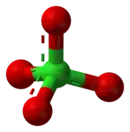| |||
| Names | |||
|---|---|---|---|
Other names
| |||
| Identifiers | |||
3D model (JSmol) |
|||
| ChemSpider | |||
PubChem CID |
|||
| |||
| |||
| Properties | |||
| [H3O]ClO4 | |||
| Molar mass | 118.47 g·mol−1 | ||
| Appearance | Colorless solid | ||
| Density | 1.96 g/cm3 | ||
| Structure[1] | |||
| Orthorhombic | |||
| Pnma | |||
a = 9.2343 Å, b = 5.8178 Å, c = 7.4606 Å | |||
| Related compounds | |||
Other anions |
Hydronium chloride | ||
Other cations |
Perchloric acid | ||
Except where otherwise noted, data are given for materials in their standard state (at 25 °C [77 °F], 100 kPa).
Infobox references | |||
Hydronium perchlorate is an inorganic chemical compound with the chemical formula [H3O]ClO4. It is an unusual salt due to it being a solid and stable hydronium salt. It consists of hydronium cations [H3O]+ and perchlorate anions ClO−4.
Production
Hydronium perchlorate is produced by the reaction of anhydrous perchloric acid and water in a 1:1 molar ratio:[2]
- HClO4 + H2O → [H3O]+ClO−4
A more analytically reliable method was reported using the macrocyclic Schiff base of sodium 2,6-diformyl-4-methylphenolate and 2,6-diformyl-4-methylphenol as a chelating agent to sequester Cu(II): transmetallation of the macrocycle with copper(II) perchlorate yielded colorless crystals of hydronium perchlorate. [1]
It can also be produced by the reaction of anhydrous nitric acid and perchloric acid.[3]
References
- 1 2 Azhar A Rahman; Anwar Usman; Suchada Chantrapromma; Hoong-Kun Fun (2003). "Redetermination of hydronium perchlorate at 193 and 293 K". Acta Crystallographica C. 59 (Pt 9): i92-4. doi:10.1107/s0108270103010461. PMID 12944636.
- ↑ C. E. Nordman (1962). "The crystal structure of hydronium perchlorate at -80°C". Acta Crystallographica. 15: 18–23. doi:10.1107/S0365110X62000055.
- ↑ Kenneth Schofield (1980). "3". Aromatic nitration. Cambridge University Press. p. 30. ISBN 9780521233620.

